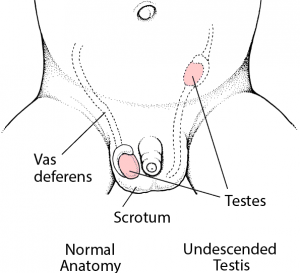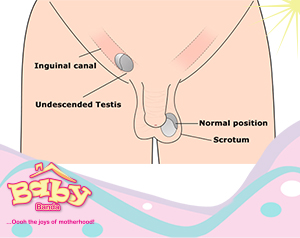The testicles are the two organs that hang in a pouch-like skin sac (the scrotum) below the penis. Normal testicles form when the baby is in the womb, and you can see them in the baby’s lower belly (abdomen).
Later they descend, or “drop” into the scrotum towards the end of pregnancy. Normal testicles attach themselves with stretchable tissue at the bottom of the scrotum.
An undescended testicle (or “testis”) is when it fails to drop into the usual place in the scrotum. Your doctor would usually do a routine physical examination to determine this.

Reasons for surgery
You should expect the undescended testicles to descend on their own between three to six months. However, if this does not happen, your son will require treatment, which may involve surgery. Here’s why:
- Fertility: Men with undescended testicles have a higher rate of infertility. They either struggle with low sperm count or poor quality of sperms in adulthood.bSo, if you don’t take your son to the hospital, you put his reproductive and health at risk.
- Testicular cancer: When your son goes for surgery to have this condition corrected, you lower his risk of getting testicular cancer later in life.
- Hernia: Your baby might have a hernia on the undescended testicle. When a boy develops naturally, his testicles move from the abdomen before birth. Then the connection between the testes and the stomach closes.Nevertheless, when the balls don’t descend, the connection does not close, increasing the chances of getting a hernia. So, during the repair of the testicle, the hernia sac is closed.
- Undescended testicles have a higher risk of spontaneously twisting and stopping the blood flow to the testicle. This condition, whose scientific name is testicular torsion, is extremely painful.
- If your son doesn’t get the right treatment early, he might lose his testes completely.
- Psychological reasons: It is essential for your baby to have both testicles in the scrotum for their psychological well-being, and yours too.
How do you know that your son has undescended testicles?
You should expect to feel the testicles in the scrotum. If that’s not the case, kindly consult your health care provider immediately. The doctor will make a tiny incision on your son’s abdomen and insert a thin tube containing a camera (laparoscopy). He may correct the problem then or schedule you for surgery.
Factors that increase the risk of undescended testicles
- Being born prematurely.
- If your family has a history of genital development complications.
- Down syndrome
- Babies who are underweight at birth.
- Mothers who abuse drugs like alcohol, tobacco, and weed when pregnant endanger their boys’ genital growth.
- Abdominal wall defects.
- Parents who expose themselves to powerful insecticides might give birth to boys with undescended testes.
Conclusion
The first step towards safeguarding your son’s health is to avoid recreational drugs during pregnancy. Then, when you give birth to a boy, check his genitals before you leave the hospital to make sure that everything is fine.













